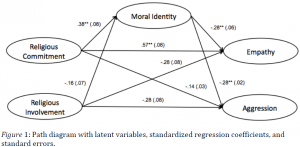David Rackham and Dr. Sam Hardy, Psychology
Proposed Project
The proposed project sought to examine moral identity as a mediation of relations between religiosity and positive and negative behaviors among emerging adults. Upon receipt of the ORCA grant in February 2010, Dr. Hardy and I began the data analysis. The analysis was performed on a large (n=3,000) national data set of college age students. It was hypothesized that moral identity will be found to be a significant mechanism of religiosity and various outcome variables. Originally, structural equation modeling was going to be used to test a model whereby moral identity is a mediator of relations between religious commitment and prosocial and antisocial behavior. Unfortunately, the initial pre-requisite analyses were not significant, and thus the hypothesized model was not tested. After discovering the lack of support for our original hypotheses, Dr. Hardy and I decided that I would participate in part of the data analysis and preparing a manuscript for a different project.
Completed Project
The ensuing project sought to evaluate moral identity (the degree to which an individual defines his or her self in terms of moral values or characteristics) as a mediator of religiosity (commitment and involvement) and adolescent empathy and aggression. In order to assess this relationship, structural equation models were fitted. Figure 1 depicts these models. For this study 502 adolescents (10-18 years) completed an online survey. The structural equation model that provided the best fit was that of an indirect relationship between religious commitment and aggression and empathy by way of moral identity. This result suggests that moral identity enables the relationship between religious commitment and aggression and empathy. Religiously committed adolescents who define their self in terms of moral values or characteristics have a lower level of aggression and a greater level of empathy. When a strong moral identity was not present, this relationship was not manifested. Interestingly, religious involvement did not demonstrate such a relationship. However, both religious involvement and commitment predicted moral identity. In light of this finding, the results of this study suggest that both religious commitment and religious involvement interact in such a way that fosters positive development (i.e. reduced antisocial behaviors and increased prosocial behaviors). Also, the results suggest that religious involvement alone does not provide a sufficient formative influence. Adolescents who are involved religiously and are also committed religiously demonstrated the highest level of positive development.
Impact
Academic
Currently an academic manuscript has been prepared which outlines the completed study and presents the results that we found. The manuscript will soon be submitted to an academic journal and will hopefully be submitted for publication. Our results demonstrate a need to examine religious behavior as a context that promotes positive development in adolescents.
Personal
While working on the two mentioned projects with Dr. Hardy I have developed and refined many skills. The initial analysis helped to apply principles from my undergraduate statistics course (Psychology 301) to answer substantive research questions. As a result of working with a moderately large dataset (approximately 3000 participants assessed on nearly 1,000 variables) I learned the importance of carefully managing and tracking the process by which your conduct your analyses. Participating in the final data analyses of the completed project I further refined these statistical skills and developed new skills in preparing an academic manuscript. I authored a substantial portion of the methods and results section, as well as prepared the tables and figures which are to be included with the published manuscript. In addition I also edited drafts of the final manuscript and performed other tasks such as verifying listed references. These opportunities have furthered my ability to think critically and present my thoughts in a documented manner. Receiving this ORCA grant enabled me with the necessary resources to participate in this opportunity.

